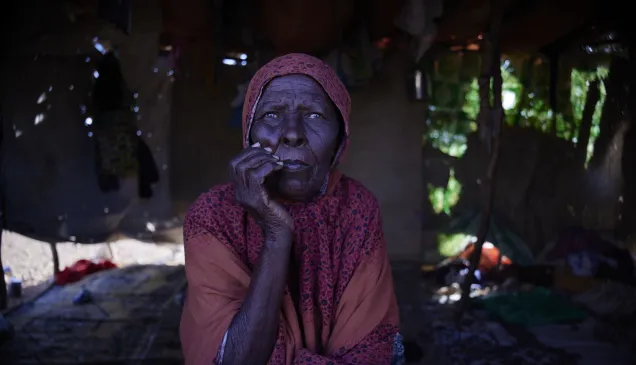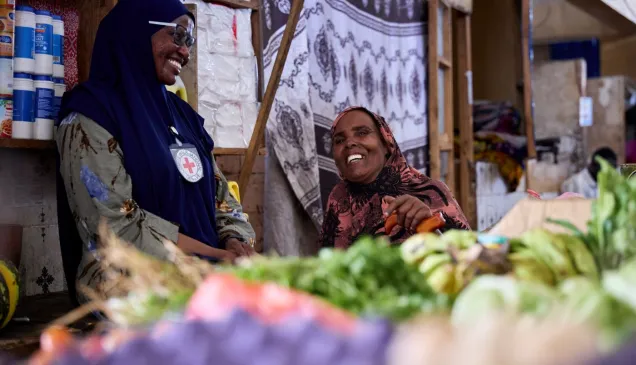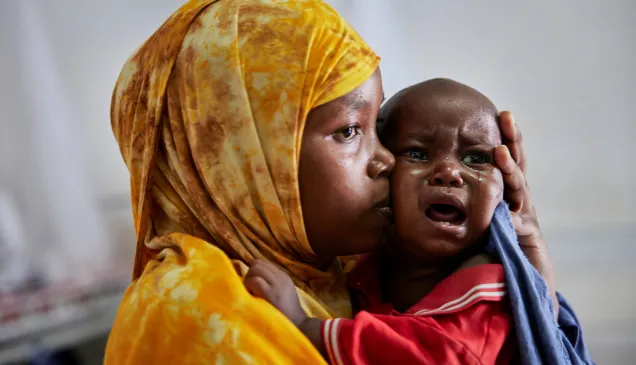What’s it like being a midwife in Somalia?
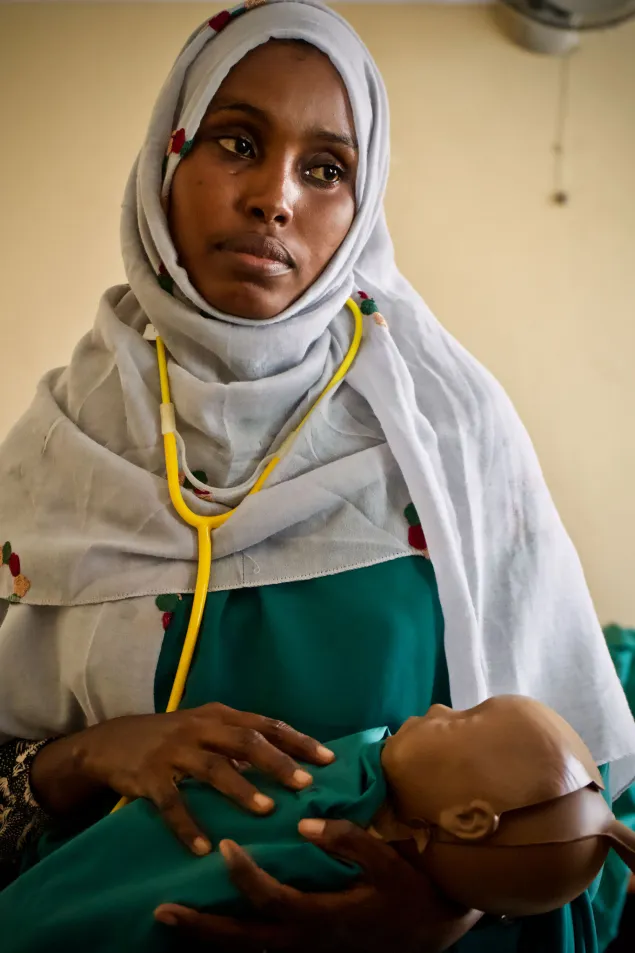
Fartun holds a dummy baby during an obstetrics training held in Nairobi for SRCS midwives.
“My mother inspired me to be a midwife. She once went through labour pains with no one around to help. She was not in a clinic and at one point fell unconscious. People came and sprinkled water on her. I felt sorry for her and helpless at the same time. I decided then that the only way to prevent such a scenario was by becoming a midwife.”
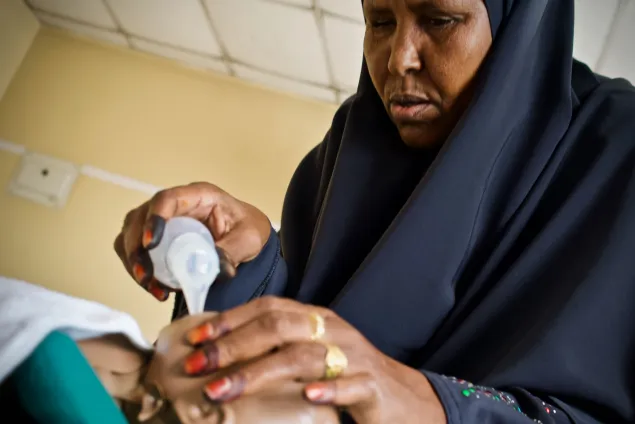
Barlin Cabdi Mohamed, 43, Bardhere, Gedo region. Experience as a midwife: 20 years
Barlin removes secretions from the ‘baby’ in preparation for neonatal resuscitation.
“There was a mother who was in labour for two days. There was no hospital in the area. She was carrying twins. I delivered one of them safely but ran into complications with the second baby. We were forced to take her by car to Beled Hawa (the closest district in Gedo). She delivered the second baby while we were on our way. That was one of my happiest moments on the job for me and I was in the car with her the whole time.”
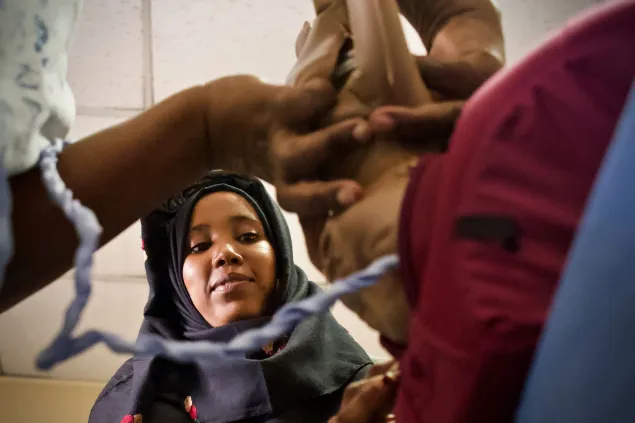
Nimco Hussein Osman, 22, Dusamareb, Galgaduud region. Experience as a midwife: Three years
Nimco Hussein watching a demonstration of a breech birth. This is when a baby is born bottom first instead of the head. Most babies in the breech position are born by caesarean section because it is seen as safer than being born vaginally.
“The SRCS clinic is equipped to handle normal (low risk) deliveries. One time, a mother who had just given birth at home with the help of a traditional birth attendant came in. She still had the placenta inside her but the baby was out. Fortunately, her cervix was still open and I was able to stabilize her and remove the placenta. There was a lot of bleeding.”
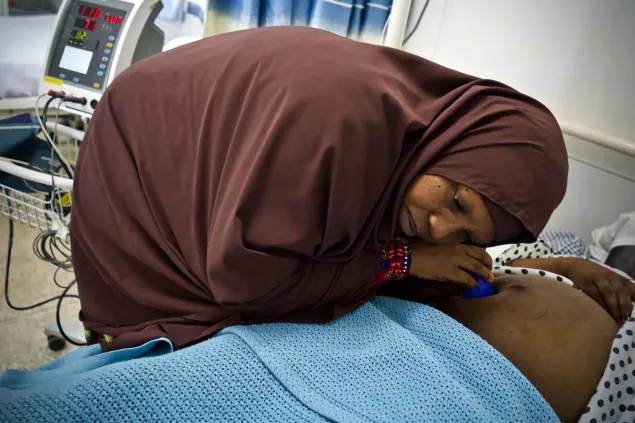
Ayni Osman Hiding, 44, Baidoa, Bay region. Experience as a midwife: Nine years
Ayni listening for the foetal heart rate.
“The presentation/position of the baby was off. Before the mother was brought in, a traditional birth attendant had tried to deliver the baby but was not able to. The mother was in a lot of pain. We realized vaginal delivery was impossible and had to wait for a doctor who would operate on her. All the while, the mother was in agony, screaming for help asking why we just stood there staring. We finally transferred her to the theatre and the doctor operated on her. We believed the baby was stillborn. I started wrapping cloth around the baby when I thought I felt a faint heartbeat. The baby seemed disfigured and had a swollen face from the complications and I could not really tell. I immediately began to resuscitate and this worked. In the end both mother and baby were safe. This was a daunting experience.”
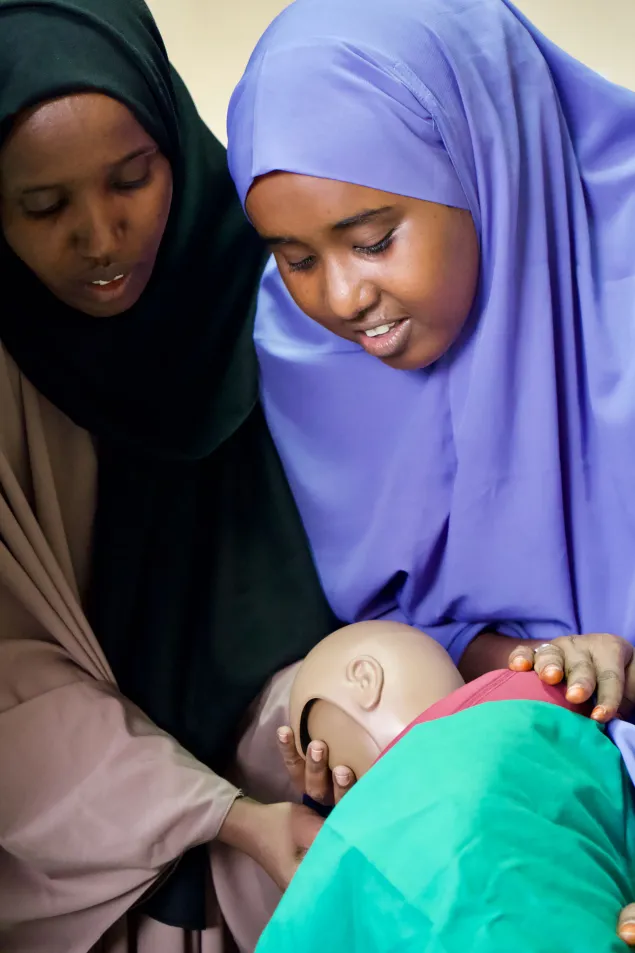
Fardosa Abdi Abdullahi (right), 24, Mogadishu, Banadir region. Experience as a midwife: Four years
Fardosa manoeuvres the ‘baby’ around during a session on managing complicated deliveries.
“There is a high maternity mortality rate in Somalia. My mum had trouble finding a midwife during her pregnancy. At the clinic where I work, a pregnant woman once came in bleeding severely. We managed to save both the baby and mother. I try to do my part to reduce the number of maternal deaths.”
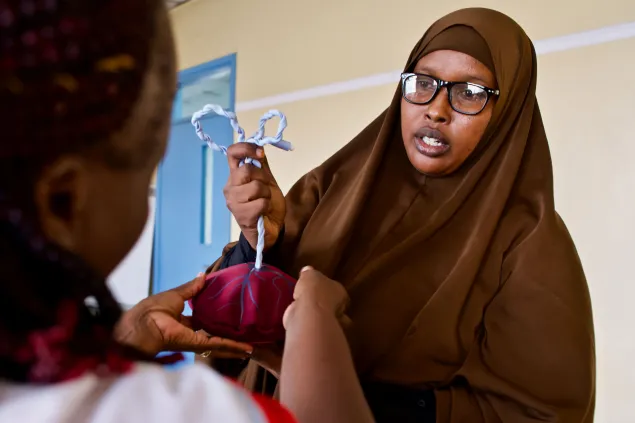
Nadhifa Abukar Mohamed, 32, Mogadishu, Banadir region. Experience as a midwife: Six years
Nadifa is taken through active management of the placenta.
“I was on night duty alone at the clinic when a mother in labour came in. She was already in severe pain having spent a lot of time with a traditional birth attendant with no success. Her cervix was fully open ready to let the baby through. So there was no time to check her condition or give medication. She started convulsing as I was putting on the gloves. There I was, alone, with the mother shaking on the delivery bed and a baby about to come any minute. I called for help but the watchman was too far away. I did not know what to do. Should I hold the shaking mother to prevent her from falling off the bed or should I deal with the baby instead. I took the risk and strapped her using belts on the bed. I then dashed to the nearest shelf to get some medication and gave it to her before turning my attention to the baby. Alhamdullilah, the mother delivered a healthy baby.”
There's an overbearing feeling of helplessness that sets in when you are unable to do anything to ease a woman's ordeal during child labour. Imagine having to deliver a baby while traveling to the clinic. Now imagine holding a new-born baby you thought had passed away in your arms, only to feel a faint heartbeat. These are just some of the real-life experiences shared by midwives working in Somalia.
Yes, deliveries can go wrong sometimes, but proper planning and the antenatal care offered during the pregnancy helps to anticipate complications that could threaten the life of the new-born and the mother. Unfortunately, in areas affected by conflict, where access to basic health care is a challenge, specialized care remains out of reach for most pregnant women.
In Somalia, the number of deliveries that fall in the capable hands of the midwives is not nearly enough. Twelve midwives working with the Somali Red Crescent Society (SRCS) took part in an obstetrics training that was held in Nairobi, Kenya. We asked a few of them what their inspirations were and some of their unforgettable moments while ushering in new-borns in Somalia.

